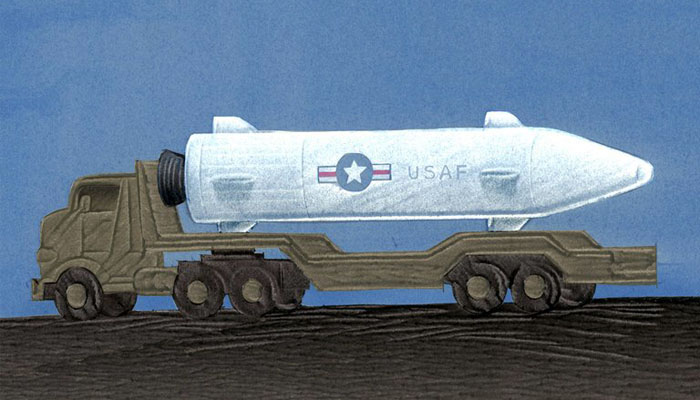A New York Times editorial published on Friday suggests that the US move some 50 tactical nuclear weapons stationed at Turkey’s İncirlik Airbase before Turkish-American relations collapse.
According to the NYT editorial, the relationship between Turkey and the US has deteriorated dramatically as Turkey’s President Recep Tayyip Erdoğan has violated basic civil liberties and other democratic norms, is buying a Russian air defense system and is holding American citizens hostage.
The NYT said Erdoğan has long used the US as a whipping boy to divert attention from his political problems, most recently falsely implicating Washington in a failed coup last year and using a post-coup roundup of alleged enemies, which includes about a dozen Americans and also some Turkish nationals who work at American diplomatic missions in Turkey.
After Turkish authorities arrested Metin Topuz, a staff member at the US Consulate General in İstanbul, on Oct. 4 both Ankara and Washington decided to stop issuing non-immigrant visas.
“It’d be smart to move the weapons before Turkish-American relations collapse. A withdrawal would probably best be done quickly and covertly after the American-led coalition captures Raqqa, Syria, from the Islamic State,” the Times suggested.
According to the NYT, Erdoğan is worried about the impending trial in the US of Reza Zarrab, a Turkish-Iranian gold dealer jailed since March 2016 on accusations of violating sanctions on Iran, because he is connected to a corruption scandal that almost brought down Erdoğan’s government in December 2013.
The Washington Post’s David Ignatius wrote on Friday that Erdoğan had demanded the release of Zarrab as well as the firing of then-US Attorney Preet Bharara, during a private meeting with then-US Vice President Joe Biden on Sept. 21, 2016, devoting half the 90-minute conversation to Zarrab.
“The case is toxic to Erdogan because it intersects with his nemesis, the self-exiled Turkish cleric Fethullah Gulen, who lives in Pennsylvania. Erdogan blames Gulen’s followers for gathering and leaking the 2013 evidence about Zarrab, which Turkish media reports say included allegations against Erdogan’s family. When Erdogan met with Biden a year ago, he claimed bizarrely that Bharara was a Gulenist tool, according to a former official,” he wrote.
Erdoğan also blames Gülen for the failed coup last year. The latter strongly denies any involvement.
On Sept. 6, the US District Court for the Southern District of New York also indicted former Turkish Economy Minister Mehmet Zafer Çağlayan, former Halkbank General Manager Süleyman Aslan, Levent Bakkal and Abdullah Happani and ordered an arrest warrant for them adding them in the investigation of Zarrab.
Zarrab was the prime suspect in a major corruption investigation in Turkey that became public in December 2013 in which with others from the inner circle of the ruling Justice and Development Party (AKP) government and then-Prime Minister Erdoğan for having paid Cabinet-level officials and bank officers bribes to facilitate transactions benefiting Iran.
After Erdoğan cast the case as a coup attempt to overthrow his government orchestrated by his political enemies, several prosecutors were removed from the case, police were reassigned and the investigation against Zarrab was dropped.
Erdoğan is already incensed by America’s indictment of 15 of his personal bodyguards after an attack on protesters in May during a visit to Washington.
The two countries are at odds over American support for Kurdish People’s Protection Units (YPG) fighters in Syria as Turkey considers the YPG to be terrorists allied with the outlawed Kurdistan Workers’ Party (PKK) in Turkey that has waged an insurgency there for 30 years.
“Washington is concerned that Turkey is distancing itself from NATO, as evidenced by its pro-Russia tilt in the Syrian war and its bid to buy a Russian missile defense system that cannot be integrated with NATO’s defenses,” the NYT editorial said.

